#thibault de montalembert
Explore tagged Tumblr posts
Text


"Girls have a thing for rugby players"
Sarah be like oh can u shut up already 🙄
98 notes
·
View notes
Text

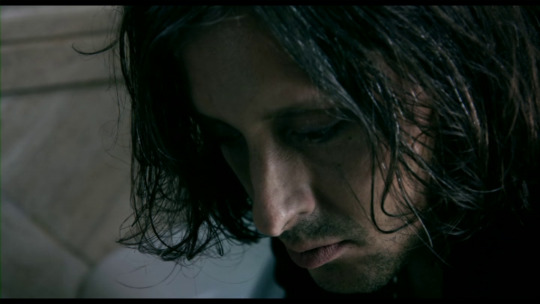


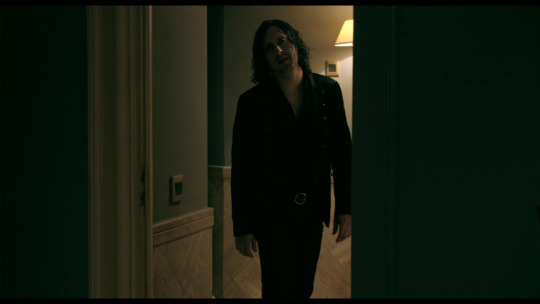


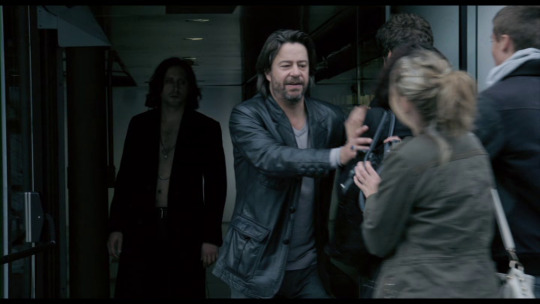


For This Is My Body 2015
#For This Is My Body#2015#carl barat#audrey bastien#thibault de montalembert#fanny ardant#tant de travail#3/10
27 notes
·
View notes
Text
Another difference between Douglas Richardson and Mathias Barneville (because there have to be some ;-) )
Roger Allam I get the feeling is, or at least can be, a bit like Douglas. He’s just kinder[1], more secure, happier, gentler. But the deadpan snark and the smooth charm and the flashy brilliance seem to be there (along with the love of cooking and singing and things!) and I get the feeling that if he ever wanted to run A Scheme he’d be brilliant at it. As long as Shaun Evans didn’t make him get the giggles at the wrong moment at least. ;-)
Thibault de Montalembert on the other hand (who is of course playing the less sympathetic, more imposing, more ruthless of the two characters), despite his truly ridiculously posh upbringing, appears to just be An Absolutely Massive Dork. :-D
Both actors do appear to be deeply lovely. This pleases me. :D
(NB: this is all based on interviews and accounts by others and my knowledge of Thibault is limited by my limited French! So, you know, do take all this with a billion pinches of salt. ;-) )
(Still want them to work together. Still feel very strongly that far more Cabin Pressure fans need to get into Dix Pour Cent!)
[1] Not that Douglas can’t be kind! He really can. But he can also be harsh and petty and very selfish and I don’t get the feeling Roger is any of those things. :-)
#cabin pressure#dix pour cent#call my agent!#douglas richardson#mathias barneville#roger allam#thibault de montalembert
9 notes
·
View notes
Text
THIBAULT DE MONTALEMBERT DANS HEARTSTOPPER??????????????????????!!!!!!
11 notes
·
View notes
Text
IL COMPLICATO MONDO DI NATHALIE, di David Foenkinos, Stéphane Foenkinos, con Karin Viard, Dara Tombroff, Anne Dorval, Thibault de Montalembert, Bruno Todeschini, 2017
VAI A UNA SCHEDA: https://www.mymovies.it/film/2017/il-complicato-mondo-di-nathalie/
youtube
View On WordPress
0 notes
Text
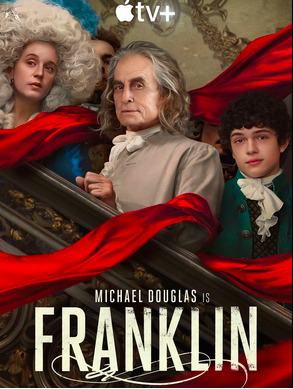
"Franklin" mini-série créée par Kirk Ellis et Howard Korder - adaptée de "A Great Improvisation: Franklin, France, and the Birth of America" de Stacy Schiff (2005) sur les années passées en Europe de Benjamin Franklin (1706-1790) pour aboutir à l'alliance franco-américaine (1778) et à la signature de la "Déclaration d'Indépendance Américaine" avec l'Angleterre (1783) - avec Michael Douglas, Noah Jupe, Ludivine Sagnier, Jeanne Balibar, Eddie Marsan, Daniel Mays, Thibault de Montalembert, Assaâd Bouab, Théodore Pellerin, Olivier Claverie, Tom Hughes, Marc Duret, Lily Dupont, Florence Darel, Aïtor de Calvairac, Sonia Bonny, Robin Renucci, Tom Pezier, Maria-Victoria Dragus et la participation de Romain Brau, mai 2024.
#films#Biopic#RevolutionFrançaise#XVIIIe siècle#Paris#Franklin#BrillonDeJouy#MarieAntoinette#LouisXVI#Beaumarchais#LignivilleHelvetius#LaFayette#Eon#Douglas#Brau#Sagnier#Pellerin#Vergennes#Chaumont#LeRayDeChaumont#Adams#Maurepas#Bancroft#Ellis#Korder#Schiff#Jupe#Balibar#Marsan#Mays
0 notes
Text
AKA (2023)
Director: Morgan S. Dalibert Starring: Alban Lenoir, Eric Cantona, Thibault de Montalembert A steely special ops agent finds his morality put to the test when he infiltrates a crime syndicate and unexpectedly bonds with the boss’s young son. Early in the film, warlord Moktar Al Tayeb’s wife and child is gunned down. Moktar is believed to be responsible for a terrorist attack on a hotel. Adam…

View On WordPress
0 notes
Text
[Streamcloud] AKA 2023 Ganzer Film Stream Deutsch
𝐆𝐚𝐧𝐳𝐞𝐫 𝐅𝐢𝐥𝐦 - AKA (𝟐𝟎𝟐𝟑) 𝐒𝐭𝐫𝐞𝐚𝐦 𝐃𝐞𝐮𝐭𝐬𝐜𝐡 𝐎𝐧𝐥𝐢𝐧𝐞 𝐀𝐧𝐬𝐜𝐡𝐚𝐮𝐞𝐧 𝐊𝐨𝐬𝐭𝐞𝐧𝐥𝐨𝐬 𝐊𝐢𝐧𝐨𝐗
AKA 𝕊tream 𝕕eutsch 2023, AKA 𝕘anzer 𝕗ilm 𝕕eutsch, AKA 𝕠nline 𝕒nschauen, AKA 𝕊treamcloud
:: Schauen Hier => https://bit.ly/44lxJcz
2 Std. 00 Min. / Thriller, Action, Krimi Regie: Morgan S. Dalibert Drehbuch: Morgan S. Dalibert, Alban Lenoir Besetzung: Alban Lenoir, Eric Cantona, Thibault de Montalembert
Der Undercover-Agent Adam Franco (Alban Lenoir) erledigt die Drecksarbeit, wo immer es nötig ist. Sein neuer Auftrag: Er soll eine mafiöse Organisation infiltrieren, um einen bevorstehenden Terroranschlag in Paris zu vereiteln. Dabei freundet er sich jedoch völlig unerwartet mit dem Sohn des Bosses an, was die Mission noch schwieriger werden lässt, als ursprünglich gedacht.
Hier finden Sie alle TV-Sendungen und Filme, die Sie online streamen können, einschließlich der Serien, die heute gezeigt werden. Wenn Sie sich fragen, was Sie auf dieser Website sehen können, wissen Sie, dass dies Genres sind, die Krimi-, Drama-, Mystery-, Action- und Abenteuerserien und -shows umfassen. Ich danke dir sehr. Wir informieren jeden, der uns gerne als Nachrichten oder Informationen über den Saisonplan, die Folgen und wie Sie Ihre Lieblingsfernsehshows sehen, akzeptiert. Ich hoffe, wir können der beste Partner für Sie sein, um Empfehlungen für TV-Shows aus verschiedenen Ländern der Welt zu finden. Das ist alles von uns, Grüße!
:: Film Der Film ist eine Kunstform, die ihren Ausdruck in der auch als Filmen bezeichneten Produktion bewegter Bilder mittels Foto-, Kamera- und Tontechnik findet, bei Stummfilmen war der Ton untergeordnet oder wurde durch unterschiedliche Möglichkeiten versucht. In der Regel werden die Bilder mit einem Filmprojektor im Dunkeln auf eine Bildwand projiziert oder auf einem Bildschirm erzeugt. Heutzutage handelt es sich bei den Filmen des Kinos und des Fernsehens meist um farbige Bilder, die vertont und musikalisch untermalt sind. Der Film ist unter anderem Gegenstand der Filmwissenschaft und der Filmtheorie. Die technische, kulturelle und künstlerische Entwicklung dieses optischen Mediums seit den Anfängen um 1900 ist unter Filmgeschichte ausführlich dargestellt.
:: Begriff Ursprünglich verstand man unter Film (englisch film ‚Häutchen‘) dünne Schichten (wie bei Ölfilm). Mit der Erfindung der Fotografie und dem Übergang von der Fotoplatte zu dem flexiblen Träger aus Cellulosenitrat für die Fotoemulsion wurde der Begriff Film für dieses elastische Fotomaterial verwendet. Übertragen wurde der Begriff auf Szenen bewegter Bilder auf derartigem Material, bis schließlich die ganze Kunstform als Film bezeichnet wurde. Es sind zahlreiche Ableitungen wie filmen, Filmen[1], Filmgeschäft oder Filmindustrie üblich.
Zu Beginn des 20. Jahrhunderts waren die Begriffe Films[2] oder Filmstreifen für einen Film üblich.
Das ursprüngliche Wort für Filmen ist dagegen Kinematographie (zu griech. kinema, Bewegung, vgl. Kinematik und -graphie ‚aufzeichnen‘), die Analogbildung zu Phonographie Tonaufzeichnung. Aus diesem Wort entwickelt sich als Verkürzung der Ausdruck Kino ‚Lichtspieltheater‘ (Lichtspiel als ‚Werk der Filmkunst‘, auch dieses Wort eine zeitgenössische Bildung der jungen Jahre des Films zu Schauspiel).
Das Filmen selbst geht über die Begriffe Film(kunst) und Kino im aktuellen Sinn hinaus und wird allgemein für das Aufzeichnen jeglicher bewegten Bilddokumente verwendet – oft ohne Film als Aufzeichnungs- oder Wiedergabemedium. Für Spielfilmproduktionen ohne Film wird die Digitale Kinokamera verwendet, für das Fernsehen Video und im privaten Bereich wird oft mit einer Digitalkamera oder einem Smartphone „gefilmt“. Tatsächlich wird die Mehrheit aller aufgenommenen bewegten Bilder und der daraus resultierenden Filmwerke ohne Film im Sinne eines photographischen Trägers produziert. Ein bekannter Ausspruch hinsichtlich dieser Veränderung im Sprachgebrauch stammt von dem Regisseur George Lucas: “I will probably never ever shoot another film – on film.” (deutsch: „Ich werde wahrscheinlich nie wieder einen Film auf Film drehen.“)[3]
1 note
·
View note
Link
As I wrote . . . plenty of corpses, but also plenty of action . . .
If your French is not so good and you can can find the subtitles,. . . .
Well, go on then . . .
Enjoy . . . !!
0 notes
Text
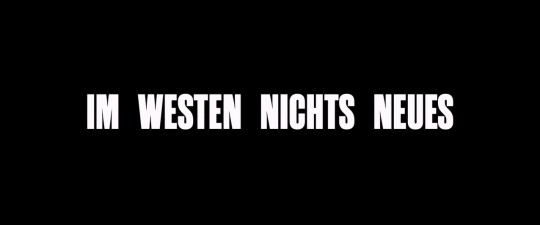





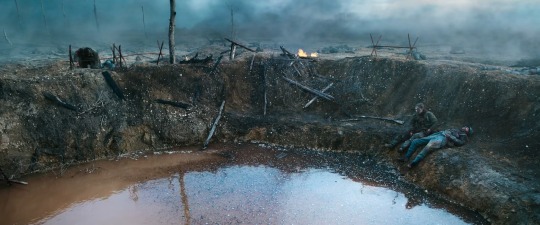


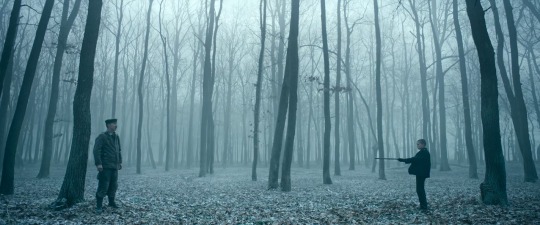
All Quiet on the Western Front (2022)
Director - Edward Berger, Cinematography - James Friend
"What is a soldier without war?"
#scenesandscreens#all quiet on the western front#Im Westen nichts Neues#edward berger#james friend#felix kammerer#albrecht schuch#aaron hilmer#moritz klaus#adrian grünewald#edin hasanovic#daniel brühl#Thibault de Montalembert#devid striesow#Andreas Döhler#sebastian hülk
277 notes
·
View notes
Text
Did someone say perfect cast?

🥰
#heartstopper#kit connor#nick nelson#olivia colman#sarah nelson#thibault de montalembert#stephane fournier nelson#jack barton#david nelson#beautiful#alice oseman#perfect cast
73 notes
·
View notes
Text
Okay but...
Someone cast Roger Allam and Thibault de Montalembert in something together please. I mean:-
- both incredible and extremely distinguished actors who are clearly very thoughtful about their craft
- both very good at playing a range of parts (and who like enormous variety) but which includes compulsive schemers with a softer, more redeemable side (Douglas Richardson and Mathias Barneville especially, though Douglas’s softer side is rather more apparent/he has rather less to be redeemed :D ).
- similar (and excellent) hair in at least some roles :D
AND ALSO:-
1. Here is a video of Roger playing blues on the guitar: https://www.youtube.com/watch?v=iV_EC3W_V-8 (and he also of course sings gloriously)
2. Here is a video of Thibault playing blues on the harmonica: https://www.youtube.com/watch?v=GlaAPspVMdo (I do not know whether he is a singer too but it wouldn’t surprise me)
Definitely needs to be something with them in together, and ideally where they get to make music of some sort. :-)
#roger allam#thibault de montalembert#cabin pressure#dix pour cent#looking forward to when all the heartstopper fans know who tdm is :D
4 notes
·
View notes
Photo
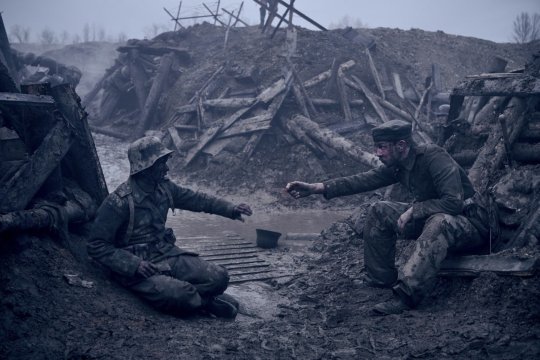
All Quiet on the Western Front (2022, Germany)
As a film buff, I retain a preference to reading a book first before seeing its adaptation. But with how many movies I see in a year – sometimes not realizing that a movie is a literary adaptation before starting it – and given how many original source materials are out-of-print or little-read (let alone how slow a reader I am), this is often too difficult a proposition. I make an attempt, however possible, to learn about the themes of an adapted book I was not able to read before heading into a film write-up. Strict fidelity to the text is not a requirement; yet a film adaptation should adhere to the spirit of the text. Any significant changes to that requires the change be done with artistic intelligence and sensitivity. Especially when the adapted book in question is significant in a peoples’ or a nation’s consciousness. Published in 1929, All Quiet on the Western Front by Erich Maria Remarque is a landmark novel in anti-war literature and remains – for its depiction of World War I on the bodies and minds of the young men sent to fight it – an important part of modern Germany’s sociopolitical identity.
Lewis Milestone’s 1930 film adaptation at Universal with Lew Ayres was the first cinematic masterpiece following the introduction of synchronized sound and the era of the silent film. Now steps in Edward Berger’s German-language adaptation for Netflix, starring Felix Kammerer, in hopes of reminding viewers that Im Westen nichts Neues (roughly “Nothing New in the West”) is, despite its universal appeal, fundamentally a German story. Berger’s All Quiet is a stupendous technical masterpiece – harrowing visual and sound effects, overflowing with blood and mud. It is among the most technically accomplished war movies this side of Saving Private Ryan (1998). Along the way, Berger’s All Quiet tries for too much, and betrays the characterizations and the intent of Remarque’s novel. With some of its violent scenes shot too aesthetically pleasing alongside an offensive and disrespectful electronic score, 2022’s All Quiet casts the French civilians and soldiers as “the enemy” rather than fellow victims. It veers perilously close to fetishizing the violence within.
Before a brief synopsis, it seems appropriate to reproduce Remarque’s epigraph to All Quiet on the Western Front here:
This book is to be neither an accusation nor a confession, and least of all an adventure, for death is not an adventure to those who stand face to face with it. It will try simply to tell of a generation of men who, even though they may have escaped shells, were destroyed by the war.
It is 1917, and the Great War has been plodding along for three years. Along with his friends Ludwig Behm (Adrian Grünewald), Albert Kropp (Aaron Hilmer), and Franz Müller (Koritz Klaus), student Paul Bäumer (Kammerer) enlists in the Imperial German Army. They all receive uniforms that, unbeknownst to them, belonged to German soldiers killed in action. Skipping almost entirely over basic training, Paul and his friends deploy to the Western Front, on the French side of the Belgium/France border. There, they befriend Stanislaus “Kat” Katczinsky (Albrecht Schuch) and Tjaden Stackfleet (Edin Hasanovic), who are several years older and have been fighting since close to the war’s beginning. These young men muddle on in drenched trenches, freezing weather, and their comrades’ horrific deaths. Parallel to the plight of Paul and his fellow soldiers is German politician Matthias Erzberger (Daniel Brühl), who secretly travels by train to the Forest of Compiègne to negotiate with French General Ferdinand Foch (Thibault de Montalembert) an armistice.
Also featuring in this film are Devid Striesow as the so-villainous-he-must-be-a-moustache-twirler General Friedrichs, as well as Andreas Döhler and Sebastian Hülk as two German officers.
This All Quiet on the Western Front occasionally frames its violent scenes as too painterly, the combat infrequently choreographed too closely to action movies (e.g., 2017’s Dunkirk is sometimes more of a suspense movie than it is a war movie and Sam Mendes’ 1917 from 2019 is an aesthetic challenge and action movie first, war film second). The opening moments are a dolly shot that linger over a patchwork of corpses strewn about No Man’s Land, with the dull rattle of machine gun fire occasionally disturbing the soil. There is an almost gawking approach to how cinematographer James Friend hovers over the bodies. One character’s death is shrouded in a blinding angelic light – applying too picturesque a technique for a non-fantastical moment. Some exceptions to this voyeuristic, perhaps fetishistic approach to framing warfare appears, including the frightening emergence of French tanks through a cloud of gas. Berger succeeds in displaying war for all its brutality. The film’s sheen, however, comes off as too aggressive and its camerawork reflecting a Netflix-esque polish.
The most glaring misstep from the screenplay by Berger, Ian Stokell, and Lesley Paterson is to include any perspectives not involving Paul and his most immediate comrades. Depicting the insights of Erzberger, Foch, and the fictional General Friedrichs removes one of the central pillars of why All Quiet on the Western Front was such a revolutionary piece of literature. Remarque’s novel, at a time when “anti-war” narrative art was in its infancy, was one of the first war narratives that concentrated entirely on common soldiers – not the officers that commanded them or the politicians that guided them.
Before focusing on Paul and his friends, let us get the officers and politicians out of the way first. The insertion of the armistice negotiations and Gen. Friedrichs’ beliefs over politicians selling the Germany army out – more on this fiction shortly – stunts Paul and his friends’ respective character growths. And despite a decent performance from Brühl, these scenes (except for the final time the elite appear) play out repetitively: Erzberger pleads to Foch for a ceasefire, Foch demands a conditional surrender that will heavily punish Germany, and Erzberger mulls over the terms of surrender. This is all distracting from the common soldiers’ experiences, and provides as much cinematic or educational value as an amateur historical reenactment.
Berger’s stated justification for including these scenes – and letting them drag on too long in the film’s second half – is reasonable. Over the last decade, the actions of far right political groups in Germany have become more visible. These contemporary groups espouse the myths that some in 1920s and ‘30s Germany used to justify the nation’s actions leading up to World War II – all which monolithized and exploited German WWI trauma to serve repugnant purposes. The emotional imbalance of the Erzberger*/Foch scenes paints France and the Allies as an unforgiving “other”, as well as the war’s eventual “victors” (the Allies did prevail in WWI, but Remarque sees no winners in warfare). For a work never meant to be an accusation and written in between the World Wars, the proto-fascist Gen. Friedrichs spits out an early form of the stab-in-the-back conspiracy theory‡. His behavior and appearance, eerily reminiscent of Allied propaganda of Germans as “the Hun”, casts him as the film’s obvious villain. These decisions all provide Berger’s All Quiet with a juxtaposition of morality more appropriate in a WWII movie than one for the Great War.
Beyond the implications of historical morality, Berger, Stokell, and Paterson’s screenplay undermines, at almost every juncture, Remarque’s critiques of the nationalism that began World War I. The decision to have Paul and his friends join the military in 1917 rather than 1914 (as it is in the book) makes it more difficult to have Paul and his friends to have conversations about the nature and the origins of this war. Instead, the screenplay keeps such dialogue to a minimum. As a result, Berger relies on cinematographer James Friend (in his first motion picture of note) to show us close-ups of Paul’s face to reveal his thoughts. In his film debut, Felix Kammerer is doing all he can with his facial and physical acting, but after a certain point this take on Paul results in him being an empty vessel.
Indeed, in Remarque’s book, Paul Bäumer is very much a reactive rather than proactive character. But that does not mean he is without deep introspection, as he is in this 2022 adaptation. Rather than someone who slowly realizes the nationalistic folly of WWI (“We loved our country as much as they; we went courageously into every action; but also we distinguished the false from true, we had suddenly learned to see.”), muses on how wars begin, and is anything but resigned to war’s inevitability, Kammerer’s Paul emotes and says nothing about these aspects of the war. Any critique from nationalism comes not from Paul in this adaptation, but from Gen. Friedrichs’ cartoonishly villainous behavior and Paul’s teachers in the film’s opening minutes. Paul and his friends are no battlefield geniuses, nor are they intellectuals. But the monotony of war – in the absence and presence of violence – grants them knowledge no classroom can give, wisdom that no elder can impart.
Berger, Stokell, and Paterson have the gall to delete entirely arguably the most critical passage in the book: Paul’s return home after being granted time for rest and recreation. After a lengthy spell fighting in the trenches, Paul’s leave completes his development as a naïve and adventure-seeking student to a detached, disillusioned man. Nationalism manipulates his father and others – mostly older men – into believing the justness of the conflict, that serving one’s country in warfare is glorious.
By contrast, Lewis Milestone’s 1930 adaptation takes Paul’s reunion with his teacher a step further than the book. In that version, instead of a chance encounter at a parade ground, Paul visits his teacher during class, with his newest students a rapt audience. The scene that follows is not subtle. But in the context of Milestone’s adaptation, the film earns it. As Paul, Lew Ayres refuses to gift his former teacher the heroic narrative he requests – paraphrasing Horace, decrying nationalism, and simply stating: “We try not to be killed; sometimes we are. That’s all.” One figures these are the words, delivered in sullen fury, by WWI’s veterans. Berger’s adaptation again leans too heavily on Kammerer to relate any semblance of the above ideas. There is no analogue scene to juxtapose the behavioral and psychological differences between battlefront and homefront, no character or even a faraway figure for Paul to verbally challenge. Kammerer’s Paul does undergo a behavioral and cognitive shift by the conclusion of 2022’s All Quiet. Yet, his transformation is not nearly as dramatic as the narrative needs it to be. These failures all stem from a screenplay that might as well have been titled something else. It is damningly incurious about Paul and his friends.
Major movie studio film scores are moving in a particular direction: amelodic, electronic, experimental, metallic, and minimalistic. It seems, by how awards voting bodies and audiences are reacting to such music, what I am about to write paints me more of an outlier than ever.
Composer Volker Bertelmann (also known as his stage name Hauschka; 2016’s Lion) concocts an anachronistic score that includes all these elements. Devoid entirely of recognizable melody (droning strings), Bertelmann’s score has one repetitive three-note idea – I refuse to call this a motif, as it lacks any sense of development from its first to final appearances – that damages and dominates the movie. Inserted in strangely timed moments and meant to intensify dread, Bertelmann’s idea begins from the root note (B♭), up a minor third (D♭), then descends a minor sixth (F). Bertelmann plays these three notes fortissimo, with synthesizer mimicking blaring brass – trust me, you know the sound and you may know its worst practitioners. When recurring underneath the strings, the idea modulates. Memorable as it may be, this metallic sound is more appropriate for hyping young men before a battle or at a rave rather than suggesting dread. Even worse: this is disruptive music. There is a healthy balance to when music should or should not accompany the imagery onscreen. One should notice music in a movie, and it should empower – but not completely overshadow – the emotions and ideas in respect to a certain scene. Bertelmann’s interruptions appear mostly in calms before the proverbial storms. These are the moments the characters and the audience should collect themselves before the killing restarts. Thus, his three-note idea abuses and instantly overstays its welcome.
Is there a place for such colorless, obnoxious, and offensively manipulative music in film? Certainly. Just not in anything entitled All Quiet on the Western Front.
On its surface, a German-language film adaptation of All Quiet on the Western Front would restore a cultural and linguistic authenticity to Remarque’s text, one of the most important literary works in German history. To some extent, Berger succeeds. His All Quiet is a technical wonder, but its human interest is nil. Remarque’s prose is not the most accomplished, but his subjective descriptions of trench warfare and his characters’ philosophizing in moments of boredom and quiet were unlike anything almost any Western reader ever encountered. We, the readers, grow alongside Paul and his friends. In 1930, the viewers saw a small group of friends – Milestone’s adaptation is unique in that Paul does not truly emerge as the main character until halfway through the film – see their youth and optimism pummeled away with each shelling and charge. A humanity remains, but tenuously. Berger’s adaptation treads an easier path by inserting a reenactment of the armistice negotiations and expediting Paul’s characterization by immediately dismantling his inwardness and sense of hope.
As a document of a generation’s experiences, a critique of that era’s nationalism that led to the conflict, and a common soldier’s processing of the war’s origin and purpose, this is a poor adaptation of Remarque’s novel. It clears the hurdle in anti-war narratives by decrying warfare as ugly. Beyond this basic expectation, it accomplishes little else.
My rating: 6/10
* Erzberger was assassinated by the far-right terrorist organization Organisation Consul (OC) in 1921. The group was disbanded the year after, but its former members were absorbed into the Nazi Party’s Schutzstaffel (SS).
‡ This conspiracy theory was primarily associated with Jews, but the Nazis also extended it to the political elite that negotiated the surrender. And as if it weren’t obvious enough, one of our German characters is stabbed in the back in the film’s concluding minutes.
For more of my reviews tagged “My Movie Odyssey”, check out the tag of the same name on my blog.
#All Quiet on the Western Front#Im Westen nichts Neues#Edward Berger#Felix Kammerer#Albrecht Schuch#Daniel Brühl#Aaron Hilmer#Moritz Klaus#Adrian Grünewald#Edin Hasanovic#Thibault de Montalembert#Devid Striesow#James Friend#Sven Budelmann#Volker Bertelmann#Hauschka#Lesley Paterson#Ian Stokell#Netflix#My Movie Odyssey
32 notes
·
View notes
Text

New characters for Heartstopper season 2!!❤️🍂
Introducing:
Bel Priestley as Naomi
Ash Self as Felix
Thibault De Montalembert as Stephane
#heartstopper#heartstopper series#osemanverse#netflix#stephane nelson#alice oseman#bel priestley#ash self#thibault de montalembert#lgbtq#transgender#trans#queer
38 notes
·
View notes
Text
'All Quiet on the Western Lunch' (JK, It's 'Front,' But I Am Hungry)
'All Quiet on the Western Lunch' (JK, It's 'Front,' But I Am Hungry)
How QUIET is it?! (CREDIT: Reiner Bajo/Netflix) Starring: Felix Kammerrer, Albrecht Schuch, Aaron Hilmer, Moritz Klaus, Adrian Grünewald, Edin Hasanovic, Daniel Brühl, Thibault de Montalembert, Devid Striesow, Andreas Döhler, Sebastian Hülk Director: Edward Berger Running Time: 147 Minutes Rating: R Release Date: October 7, 2022 (Theaters)/October 28, 2022 (Netflix) I finally got around to seeing…

View On WordPress
#Aaron Hilmer#Adrian Grünewald#Albrecht Schuch#All Quiet on the Western Front#All Quiet on the Western Front 2022#Andreas Döhler#Daniel Brühl#Devid Striesow#Edin Hasanovic#Edward Berger#Felix Kammerrer#Moritz Klaus#Sebastian Hülk#Thibault de Montalembert
2 notes
·
View notes